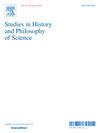B.曼德维尔的人性与治疗形式。
IF 1.8
2区 哲学
Q1 HISTORY & PHILOSOPHY OF SCIENCE
引用次数: 0
摘要
医学被认为是《蜜蜂的寓言》中提出的“人的无形部分”解剖项目的一个重要组成部分,使伯纳德·曼德维尔能够描述道德和政治的自然主义基础。矛盾的是,承认“自我否定”起源于隐藏和压抑利己主义冲动和利益的社会机制,导致了对曼德维尔《忧郁症和歇斯底里症专论》的刻板解读,根据这种刻板解读,对激情的物质主义管理是获取和治疗功能障碍的主要方法,如果不是唯一的方法的话。本文将从研究曼德维尔在《蜜蜂的寓言》中所揭示的人性原则的概念开始,通过关注《人性论》中三个对话中出现的观察的治疗形式来修正这一假设。本文章由计算机程序翻译,如有差异,请以英文原文为准。
Human nature and therapeutic forms in B. Mandeville
Medical science has been recognized as an important component of the project for the anatomy of the “invisible Part of Man” presented in The Fable of the Bees, allowing Bernard Mandeville to describe the naturalistic foundations of morality and politics. Paradoxically, the acknowledgment of “self-denial” originating in the social mechanisms that conceal and repress egoistic impulses and interests has contributed to a stereotypical reading of Mandeville’s Treatise of the Hypochondriack and Hysterick Diseases, according to which a materialistic management of the passions is the primary, if not the only, way to access and treat dysfunctions. Starting with a study of Mandeville's conception of the principles of human nature, exposed in The Fable of the Bees, this article will revise that presumption by focusing on the therapeutic forms of observation emerging in the three dialogues of the Treatise.
求助全文
通过发布文献求助,成功后即可免费获取论文全文。
去求助
来源期刊

Studies in History and Philosophy of Science
管理科学-科学史与科学哲学
CiteScore
2.50
自引率
10.00%
发文量
166
审稿时长
6.6 weeks
期刊介绍:
Studies in History and Philosophy of Science is devoted to the integrated study of the history, philosophy and sociology of the sciences. The editors encourage contributions both in the long-established areas of the history of the sciences and the philosophy of the sciences and in the topical areas of historiography of the sciences, the sciences in relation to gender, culture and society and the sciences in relation to arts. The Journal is international in scope and content and publishes papers from a wide range of countries and cultural traditions.
 求助内容:
求助内容: 应助结果提醒方式:
应助结果提醒方式:


